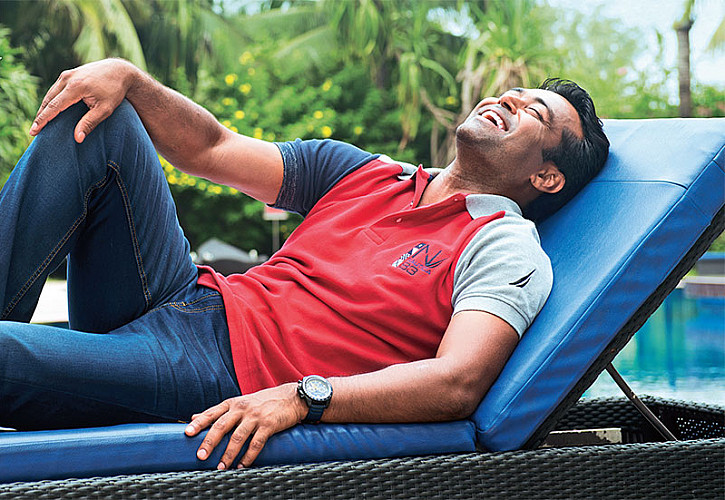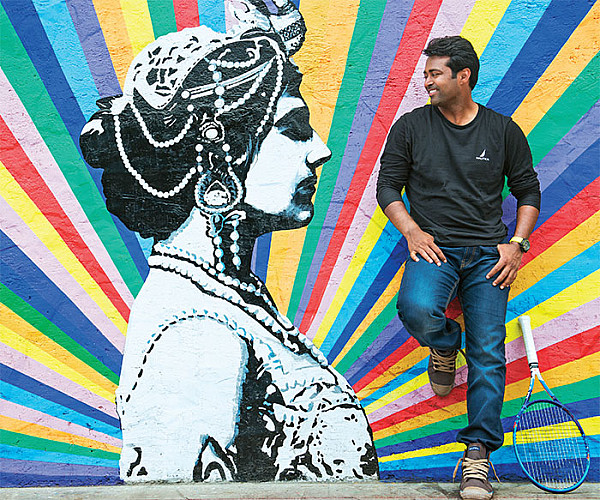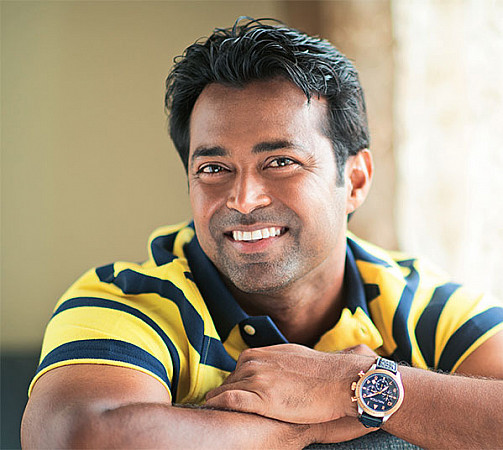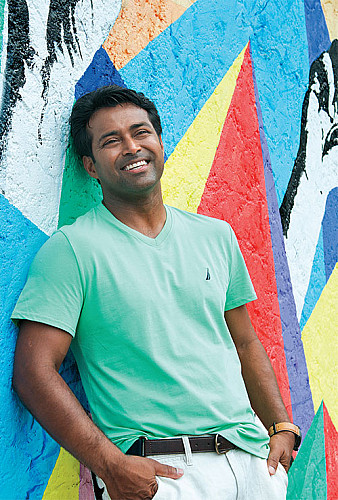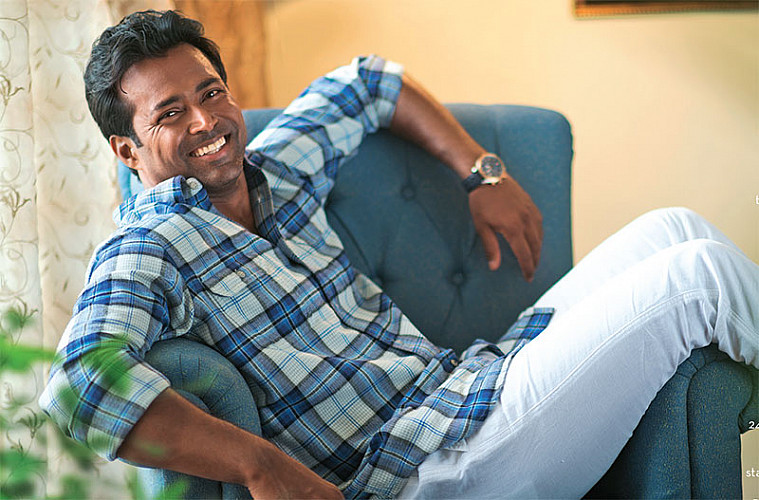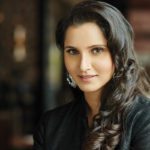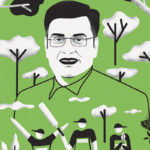Leander Paes On Pushing The Boundaries of Excellence
Fresh from his mixed doubles success at the US Open, Leander Paes has air-dashed to home and homeland. A viral infection and a toe injury do not prevent the tennis ace from keeping his commitment for the Davis Cup matches in the capital. The day after the New Delhi event, we wait for the sports star to make his due appearance at the suburban hotel, The Lalit, in Mumbai. The no-fuss Paes shows up at the appointed hour, strolls into the lobby, gives us a buzz and lopes up to the suite.
Dressed casually in a T-shirt and shorts with slippers on his feet, Paes greets the team with an easy friendliness hinting at an old acquaintance, even though he’s meeting most of us for the first time. His razor-sharp memory recalls the several interactions I have had with him over the years. After the initial exchange about the shoot — interspersed with insane laughter about loose pants and suspenders — ‘Leo’ settles down to some serious conversation, though he cannot resist erupting into wholehearted chuckles once again when he spots a bulky assistant tiptoeing gently across the wooden floor to avoid making any noise. His laughter at the Pink Panther-like prowl subsides a few minutes later and our ensuing chat rolls through many ‘takes’ — I find him focussed on the task at hand, for despite interruptions (like when the coffee and tea arrive or the stylist walks in and out to discuss looks) he seamlessly takes up the skein of thought from where we have left it.
As far as Indian tennis is concerned, 2015 belongs to Paes, for the tennis ace has grabbed the mixed-doubles titles at the Australian Open, Wimbledon and the US Open, creating history along the way. He states, “It has been a phenomenal year — it has been one of my best on tour. When you look at millions of athletes coveting one Grand Slam through their whole career, to be able to win three in one year is just a blessing. This year has also been a very tough one, so the hard yards that I have had to put in to win these three Grand Slams have made it worthwhile.”
Speaking of his latest win at the US Open leads him to talk about his most recent mixed-doubles partner, Martina Hingis. He has seen many partners come and go. He states, a little philosophically, “Some relationships have to be worked upon; some relationships are tedious, while some are very natural. This one with Martina is so natural. Intriguingly enough my relationship with Martina Navratilova, her namesake, was exactly the same, even though temperamentally both are different — one is more aggressive, the other laidback, even though they are both perfectionists and strive for excellence on the court and off it too. Their energy and passion shows that age is just a number. The tennis ball does not know what age the person who is hitting it is; it is all about the power, the speed and the spin. In life too it is not an age thing. Certain people in the world break through the chains of the norms of society.”
Time has writ its indelible script on his life, yet Paes continues to exhibit an enthusiastic, never-say-die spirit. Though conscious of the fleeting years, he believes in ‘being alive’ at every moment. And, this year, at 42, when most players have hung up their racquets, the champion has added not one, but three feathers to his cap. Dismissing the weight of years and his near-veteran status, Paes states frankly, “Winning feels awesome. The one thing that I enjoy is testing the boundaries of fitness, pushing the boundaries of excellence. There is a lot of talk about how many more years I will be playing; there is also talk about me going for my seventh Olympics. There was a silly thing I read about how I should retire. But, my passion for the game, my passion for life keeps me going. As long as I love what I do, as long as I wake up in the morning and still really crave to push my body and mind, and as long as I feel that I can still win Grand Slams and Olympic medals, I will continue playing.”
Being on the court for individual glory and the country’s honour has been a part of his decades-long career. When I quiz him about what drives him more, Paes answers, “The cause of playing for my people, my flag, for my country drives me immensely. This passion comes from my pedigree. My mom (Jennifer Paes) captained India in basketball, my dad (Vece Paes) played for the country in hockey and he was a part of the team that won a bronze at the 1972 Olympics. At home, growing up, the conversation was always about achieving and maximising our potential. When I was about 10 or 11, I would iron my parents’ playing jerseys and dream about being at the Olympics. My career has been documented carefully but my emotions have not. My feelings while playing for the country are so strong that it makes it more worthwhile than my 17 Grand Slams or earning an X amount of dollars.”
Paes’s path to his titles has not been a smooth one. It has involved making tough choices. Initially, the lad who shone in different sports — football, tennis, hockey, cricket, basketball and boxing — had to choose his calling. He recalls, “I had too many options as an athlete. I had even got a scholarship to a European football team. But having chosen that, I would have had to surrender my passport and take up a European one so that they could invest time and money into my career. But that was not my deal. I wanted to emulate my parents by playing for India. Healthwise, I had Osgood-Schlatter in my knees and was in braces for a while. Then my mitral valve had a problem and needed looking after. Doctors told my father that I would never be an athlete and if he put me into rigorous training, it could be dangerous for my health. Learning tennis was not easy. In 1986, the infrastructure here left much to be desired. I left home at 12 and had to handle my own passport, bank account, schooling and daily schedule. Not many people will understand the loneliness of excellence unless they walk that mile. And when you walk that mile you realise that there are many more miles to walk. I can talk endlessly about how I have not spent a birthday at home since I was 12, how I have spent only a few Christmases at home since Aiyana was born, how I missed both my sisters’ weddings because of my tennis schedules. But I believe that every human being has to make a sacrifice to achieve excellence. And, this was my journey to run!”
Along the road that he chose, his self-confidence stood him in good stead. When faced with problems, Paes states, “My belief in my own being is my greatest strength. One of my nicknames is ‘Solution Man’. Rather than brooding and pondering over the obstacles or hurdles, I find a way to jump them or circumnavigate them.”
Seeing that Paes is in an expansive mood this Monday morning, I venture to touch upon the relationships in his life — both personal and professional — that soured after a lot of time and feeling had been invested in them. The most talked about was the Lee-Hesh professional partnership and the break up in his personal life with Rhea Pillai. He reflects, looking back at his long associations, “Professionally, I have had 103 men’s doubles partners and 26 mixed-doubles partners. Out of that may be one per cent of them or one relationship went through a rough patch. Mahesh and I have always had an underlying respect for each other, but there have been times in our lives when we have not communicated the best to each other, for whatever reasons. If you look at the 129 doubles partners I have had, having just one that went through a rough phase is pretty phenomenal. And, Mahesh and I have written the greatest history in Indian tennis. I believe that in life not everything is perfect. But being in the spotlight magnifies everything. And it is how you go through the tough weather that defines you, much more than the euphoric times you are standing on a podium holding a medal. Almost everyone can handle good times, but only a few can handle great and traumatic times and treat both in the same way.”
In the recent past, his break-up with Rhea and the custody battle for Aiyana have made news. Despite these happenings that would have mentally reduced a lesser man to despair, Paes went out and did his best in the sport he loves. When I ask him how he seemed to remain calm through the entire storm, he states, “It is not easy, but I try and compartmentalise. At the end of the day, I am just another human being. I have emotions and feelings. I do go through difficult thought processes, but at the same time I am very rugged. My profession and my journey have taught me certain life skills. I admit that it has been a hard time; the only thing I can do is try to be the best I can be.”
His professional career and personal life have been variously chronicled, the latter often providing fodder for the gossip mill. Paes is unfazed by the attention. He affirms, “I have always lived in a fish bowl. My life and belief systems are transparent to a fault, so much so that people can take advantage of me. Being in the limelight means that people often look at me differently from how I would look at myself. I still see myself as that young Indian boy who has a zest for life, a passion for excellence. The world sees me in a different light and that took some time getting used to. Beiing who I am, I have a great sense of responsibility. I cannot please everybody and I do not strive to. What is important to me is to be myself, to be true to who I am.”
Will the real Leander stand up? “I am actually very shy,” he says. “Over the years, I have learnt to be a little more of a people’s person. I have different shades of shyness and confidence. When people look at me they are not sure what I am, which is a good thing because I like to keep my opponents thrown off. I am not here to make best friends with them. I am here to achieve my goal. I want to win.”
Paes admits that it feels good when he sees generations — from grandfathers to fathers to children — watch his game. He emphasises, “It is quite unique to transgress through generations and reinvent myself, to stay ahead of the game, not just as an athlete but also as a person.” So, I ask him what kind of a role model he wants to be for his young daughter. Paes is prompt in replying, “Just the same that my dad was for me. He is a phenomenal dad. He has been there through thick and thin for all three of us kids, his peers, friends and family. If I can emulate my dad and be the kind of father that he is to me, to Aiyana, I will be very happy.”
Over the years, Brand Leander has developed its own identity. The star has walked the ramp on several occasions, done a movie Rajdhani Express that was soon forgotten, and become a much wooed figure in society. Paes says, “Brand Leander is real. It is patriotic. For it, reinvention would be a mother word, for, in every single department of my life I am reinventing myself. Brand Leander is a mix of old-school values and cutting-edge thinking. The brand is so diverse, it could be multi-cultural. I like different people to identify with it — whether it is through clothes, corporate speaking, television work or the movies. Just as in tennis I never won at my first Wimbledon, but I subsequently went on to win six Wimbledon titles, the same thing happened with the movies. I learnt a harsh lesson on my first ride. But I love to entertain people and Brand Leander is a people’s brand. People from different walks of my life ask me what I am going to do next. I like to do things that are earthy, natural and integral to who I am.”
What next, I ask him before we get into photography mode. “I want to continue creating history in different ways. The most important part of my life is just starting. With tennis I have been able to reach millions. Through the time I will have away from the game of tennis, I will interact with a 100 million. I want to use the vehicle that tennis has given me to make a difference. Once I finish with tennis and get into my second innings, I want to make a much larger difference by my oratory skills and by my ability to read human beings and connect with them. I sometimes worry about not having enough time to do what I want to do. Life is short — to maximise time is very important to me!”
Related posts from Verve:
Verve Trending
Sorry. No data so far.
us on Facebook to stay updated with the latest trends

